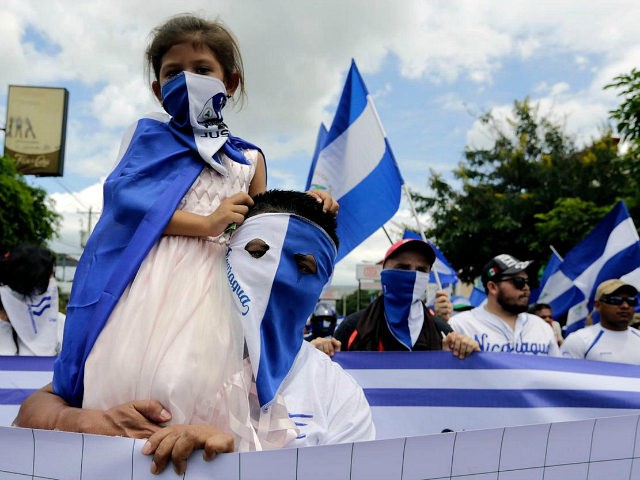The U.S. Ambassador to the United Nations Nikki Haley led a United Nations Security Council debate on the crisis in Nicaragua on Wednesday, as Daniel Ortega’s communist regime continues to brutally repress political dissidents.
Haley, currently President of United Nations Security Council as part of its rotating leadership, originally had her proposal for a meeting on Nicaragua blocked by five other countries including China and Russia.
“The Security Council should not, it cannot, be a passive observer as Nicaragua continues to decline into a failed, corrupt and dictatorial state because we know where this path leads,” Haley said on Wednesday.
“The Syrian exodus has produced millions of refugees, sowing instability throughout the Middle East and Europe,” she continued. “The Venezuelan exodus has become the largest displacement of people in the history of Latin America. A Nicaraguan exodus would overwhelm its neighbors and create a surge of migrants and asylum-seekers in Central America.”
Gonzalo Koncke of the Organization of American States (OAS) also briefed the council on their efforts to contain the country’s ongoing crisis.
“We see crises of human rights and democracy in the Americas,” Koncke explained. “We have the migratory crisis in Venezuela which should be a cautionary tale for us. Nicaragua cannot continue to have an upsurge in its political and economic life. … and we can only see an increase in the migratory crisis if this continues. And this is a threat to regional security.”
Nicaragua’s Foreign Minister Denis Moncada Colindres denounced the debate as “a clear interference in the internal affairs of Nicaragua, and a violation of the Charter of the United Nations and International Law.”
Whether a full Security Council meeting will take place will now be subject to a vote as nine members of the current council are required to pass the agenda. Countries including Ethiopia, Equatorial Guinea, and Kuwait have expressed concern over the idea but are still understood to be undecided.
“Although we deplore the internal situation in that Latin American country and we call on the government of Nicaragua to do its utmost to arrive at a solution to this domestic problem, our government is of the view that this is a situation that is not yet ripe for debate in the Security Council,” explained Anatolio Ndong Mba, Equatorial Guinea’s U.N. ambassador on Tuesday.
Protests in Nicaragua emerged in April amid anger over social security reforms and a growing fear that the Central American country is transforming into a socialist dictatorship similar to that of Maduro’s Venezuela.
In the past four months, at least 322 have died and thousands more left injured as a result of a government-sponsored crackdown against political demonstrators demanding Ortega step down and call fresh elections. Pro-government gangs have also begun targeting Catholic Churches, many of whose members are opposed to his leadership.
There are now growing fears that the crisis could spark a migration crisis that involves many Nicaraguans trying to enter the United States illegally.
Last week, the Ortega regime announced it would expel a team of United Nations human rights observers after the U.N. High Commissioner for Human Rights published a report accusing his leadership of orchestrating violence through government-funded gangs. Ortega accused the U.N. of supporting the demonstrators. The U.N. observers have said they will continue to monitor the crisis from abroad.
The 72-year-old strongman, a former communist guerrilla who has led the Sandinista National Liberation Front since the 1970s, currently presiding over high rates of unemployment and stagnant economic growth. His regime also remains a close ally of many of the world’s most autocratic regimes, developing relationships with other leftist Latin American allies such as Cuba, Bolivia, and Venezuela, as well as regimes further afield such as China, Syria, and Russia.
Follow Ben Kew on Facebook, Twitter at @ben_kew, or email him at bkew@breitbart.com.

COMMENTS
Please let us know if you're having issues with commenting.